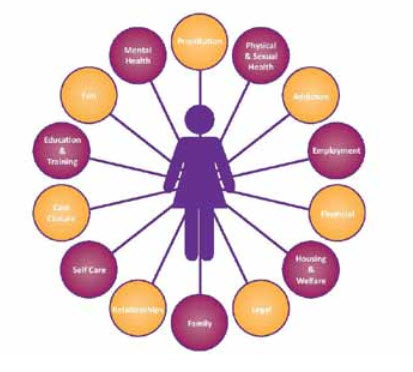Keane, Martin (2015) Ruhama annual report 2013. Drugnet Ireland, Issue 52, Winter 2014, p. 23.
| Preview | Title | Contact |
|---|---|---|
|
PDF (Drugnet Ireland 52)
1MB |
On 5 November 2014 at the Alexander Hotel in Dublin, Senator Ivana Bacik launched Ruhama’s annual report for 2013.1 The launch also marked the 25th anniversary of Ruhama’s work supporting women affected by prostitution and sex trafficking. Ruhama provides front-line services to these women and also advocates and lobbies for legislative and policy change to reduce the exploitation and harms associated with prostitution and sex trafficking. This article summarises the main reported activities from Ruhama’s front-line services during 2013.

Street outreach
Ruhama provides practical support and information to women in street-based prostitution through its street outreach van. When Ruhama was set up in 1989, the first service it provided was this outreach support from a mobile van. The van now operates up to four nights a week: in 2013 the service was provided on 130 nights and supported 70 women, 10 of whom were referred on to Ruhama’s casework service. According to Ruhama, ‘…addiction to drugs and/or alcohol is one of the main presenting issues for women in street prostitution…’ (p. 9). In addition, women present with issues around financial debt, homelessness, poor mental and physical health, suicide ideation and domestic violence. Ruhama provides information to women on its own services and those of other agencies which may be able to assist with the problems that women present with.
Casework and care planning
The casework model that Ruhama uses involves a person-centred care plan that responds to the holistic needs of the women. As such, each care plan is tailored to the unique circumstances of each woman. In 2013, 219 women were engaged in casework with Ruhama, 96 for the first time and 123 continuing on from the previous year. The 219 women came from 36 different countries, and 83 of them were suspected of being victims of sex trafficking. According to Ruhama, ‘…the main focus of the care planning process is empowerment [of the women].…This process assists women in taking control of their lives…the process also endeavours to ensure that women make informed choices out of the options available to them…’ (p. 10). By the end of 2013, 63 women had completed their care plans and moved on to new opportunities.
Education and development
According to Ruhama, ‘Many of the women who access Ruhama’s services do not initially have the confidence for, or face barriers that restrict their uptake of, mainstream education and development opportunities…our Education and Development programme…offers practical supports which equip women with the skills they need to proceed to further education or the employment market’ (p. 12). In 2013, 68 women engaged with the education and development programme, which included group activities and one-to-one sessions. One group activity was the Sarah Bird pilot programme which assists women with post-traumatic stress disorder (PTSD) by using a non-invasive approach to healing and body trauma for women who feel unable to engage in talking therapies. Reporting on an internal evaluation of this pilot programme, the annual report states, ‘The two most consistent results of the programme were that women reported a substantial increase in feelings of self-worth and they stated that they had regained control of their lives’ (p. 13).
Housing and social welfare
In 2013, 42 women were supported by Ruhama to secure housing, 32 were assisted to develop budgeting skills to manage their households, and 35 were supported with processing paperwork and completing forms relevant to the housing and budgeting processes. The women presenting to Ruhama reported difficulties in accessing suitable accommodation, in particular securing accommodation through the private rental market. Ruhama reports that ‘…landlords were looking for significant increases in rent while at the same time, the allocated rent allowance decreased. Women found it increasingly difficult to secure one month deposit and one month rent in advance for private rented accommodation, particularly those women who had been in Direct Provision (the asylum seeking process) on €19.10 per week…’ (p. 15).
As noted earlier, many of the women with whom Ruhama engages through the street outreach service present with addiction to alcohol and/or drugs; homelessness is also a feature of their lives. Ruhama reports that ‘… 2013 saw a marked increase in the number of Irish women accessing emergency or homeless accommodation in Dublin. For some the combination of homelessness and chaotic drug use further complicated women’s positions of vulnerability and drove them further into street prostitution’ (p. 15).
Conclusion
Ruhama’s annual report for 2013 is a useful insight into the nature and extent of the work undertaken by the organisation. However, work of this kind with such vulnerable and marginalised women can rarely be captured by reference to numbers and categories. In the words of the chairperson of Ruhama:
…This report contains many statistics, but behind each statistic is an individual woman’s story with her personal experience of prostitution. When women access our service they know they have no need to hide their experiences of prostitution; they will not be judged and will receive support to gain autonomy and make real choices (p. 3).
- Ruhama (2014) Ruhama annual report 2013. Dublin: Ruhama. https://www.drugsandalcohol.ie/22900/
L Social psychology and related concepts > Family > Family and kinship > Family support
MM-MO Crime and law > Public order offence / social code crime > Prostitution / sex-work
VA Geographic area > Europe > Ireland
Repository Staff Only: item control page